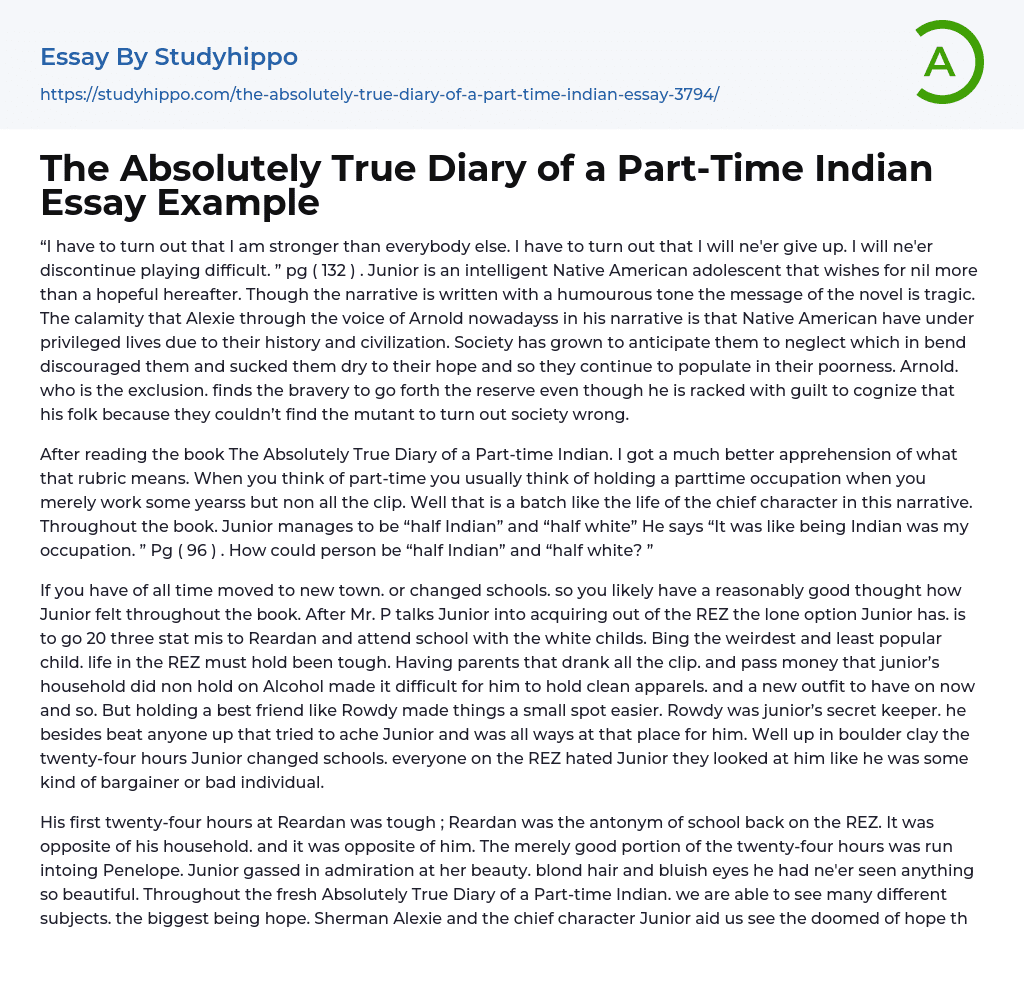

The Absolutely True Diary of a Part-Time Indian Essay Example
"I have to prove that I am stronger than everyone else. I have to prove that I will never give up. I will never stop playing hard." (pg 132)
The protagonist, Junior, is a bright Native American teenager who longs for a hopeful future. Despite the humor in the narrative, the novel's message is tragic. Through Arnold's voice, Alexie portrays the tragedy of Native Americans' disadvantaged lives caused by their history and culture. Society expects them to fail, which demoralizes them and drains their hope, causing them to languish in poverty. Arnold, however, defies this expectation by finding the courage to leave the reservation, albeit burdened by guilt for not being able to change society's perception of his people. After reading The Absolutely True Diary of a Part-Time Indian, I gained a better understanding of
...the significance of the title. Part-time typically refers to having a job only on certain days rather than full-time. Similarly, the main character in this story manages to exist as "half Indian" and "half white." He remarks, "It was like being Indian was my job" (pg 96). How can one be both "half Indian" and "half white?" This experience mirrors the challenges faced when moving to a new town or changing schools.Throughout the book, we can gather a good understanding of how Junior felt. Mr. P convinces him to leave the reservation and attend school with white kids in Reardan, which is 23 miles away. Being the peculiar and unpopular kid, life in the reservation must have been difficult for Junior. His parents were constantly drinking and spending money on alcohol, making it challenging for him to have clean clothes o
an occasional new outfit. However, having a best friend like Rowdy made things a little easier. Rowdy was not only Junior's secret keeper but also protected him from anyone who tried to harm him. However, after changing schools, everyone on the reservation hated Junior and viewed him negatively. His first day at Reardan was tough, as it was the complete opposite of his previous school. The only positive aspect of the day was meeting Penelope, whose beauty left Junior in awe with her blonde hair and blue eyes. As we read Absolutely True Diary of a Part-time Indian, we encounter various themes, with hope being the most prominent one. Both Sherman Alexie and Junior himself illustrate the loss of hope through Junior's diary entries and drawings.Throughout the narrative, we witness how Junior, his family, and friends all initially have little hope. Despite being constantly knocked down, one would expect someone to hold onto some form of hope, but that doesn't happen. A prime example of this loss of hope occurs when Junior speaks to his teacher after throwing a book at the teacher's face. On page 41, Junior says, "No teacher had ever said anything so nice... to me." This quote reveals the lack of hope the people on the reservation have in themselves and others. It is quite taboo in the modern world where most teachers are supposed to instill hope in their students. Additionally, we see how Junior believes that race plays a role in hope. Multiple characters express that whites have a better chance at a successful life compared to Indians or any other race. We get a firsthand glimpse into this
belief when Junior draws a picture of a white unicorn and declares on page 51, "I don't know if hope is white, but I do know that for me it's like some mythical creature." This not only showcases Junior's feelings of inferiority towards the white race but also highlights the absence of hope in his life up until this point. To him, it seemed that he was destined to grow up and be like his father and the other men on the reservation.Alcoholic and struggling to operate computer terminals encounter with extremely concise instructions. This can be a deeply sad and difficult experience. Junior, upon being transferred to Reardan, doesn't know how to communicate with the "white" people and is somewhat afraid of them. However, he quickly makes friends and realizes that it's alright, white people aren't inherently bad (even if they can be racist). In Sherman Alexie's book, "The Absolutely True Diary of a Part-time Indian", the author suggests that hating oneself will only make life more challenging. Instead, one should accept oneself to improve and find happiness in life. In conclusion, Arnold made both good and bad decisions. One of the decisions he made was to forgive others, throw a book at a teacher, and attend a predominantly white school. By forgiving those who hurt him, Arnold was able to transform his life. He believed that forgiveness had the power to change anything.
- Ambition essays
- Anger essays
- Betrayal essays
- Boredom essays
- Confidence essays
- Courage essays
- Desire essays
- Disgrace essays
- Doubt essays
- Empathy essays
- Fairness essays
- Fear essays
- Feeling essays
- Forgiveness essays
- Grief essays
- Guilt essays
- Happiness essays
- Harmony essays
- Hate essays
- Honesty essays
- Honor essays
- Hope essays
- Humanity essays
- Inspiration essays
- Kindness essays
- Laughter essays
- Loneliness essays
- Lost essays
- Loyalty essays
- Need essays
- Passion essays
- Pressure essays
- Pride essays
- Regret essays
- Respect essays
- Responsibility essays
- Sarcasm essays
- Shame essays
- Suffering essays
- Suspense essays
- Tolerance essays
- Bangladesh essays
- China essays
- Hong Kong essays
- India essays
- Japan essays
- Kuala Lumpur essays
- Malaysia essays
- Manila essays
- Pakistan essays



